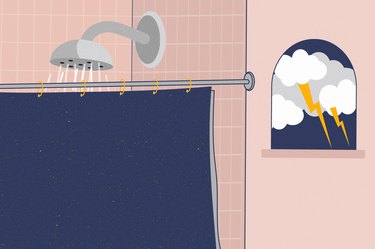
When thunder roars and lightning shoots across the sky, it might feel obvious to head indoors. But being inside during a thunderstorm comes with some risks, too.
Which begs the question: Can you shower during a thunderstorm?
Video of the Day
Here, a lightning safety specialist explains whether it's dangerous to shower during lightning along with how to time your bath or shower safely.
What Happens if You Take a Shower During a Thunderstorm
If you've ever wondered if you can shower or take a bath during a thunderstorm, the simple answer is that you shouldn't.
"Lightning can come into the water because water conducts electricity," says Mary Ann Cooper, MD, an emergency medicine doctor and medical and lightning safety specialist for the National Lightning Safety Council.
Lightning can also travel though plumbing, then indirectly hit you and cause a lightning injury. It even travels faster through plumping, wires and metal, causing an immediate threat if it hits your home or building. "That's why you don't want to be in a shower," Dr. Cooper says.
And it's not just bathing that should be avoided. Any indoor activities that involve plumbing should be avoided during a thunderstorm, too, according to the National Lightning Safety Council. That includes washing your dishes or hand-washing clothes.
The Possible Effects of a Lightning Strike
According to the National Weather Service (NWS), lightning is five times hotter than the sun.
And while it's rare — the odds of being struck in your lifetime are about 1 in 15,300, per the NWS — any direct or indirect contact with lightning can result in serious and possibly permanent injury.
Per Dr. Cooper, common side effects of a lightning strike include:
- Brain injury
- Chronic pain
- Minor burns
"Lightning injury is a nervous system injury, not a burn injury," she says. "Most of the time, the burns from lightning are very minor — not the kind that require hospitalization."
Brain injury from a lightning strike, however, may cause more serious effects, like amnesia, forgetfulness and difficulty learning new skills.
The symptoms of a close lightning strike vs. being indirectly struck are fairly similar, Dr. Cooper says. "We don't have the research to show that the injuries of someone directly struck are different than those of somebody who had indirect contact," she adds.
Tip
Getting struck by lightning is pretty rare, but your risk depends on where you live. If you live in a climate prone to thunder and lightning storms, your chances are higher of you or your house getting struck. For example, according to the Centers for Disease Control and Prevention, those living in the southern United States are more at risk of lightning injuries than those in the North. Summertime also poses a higher risk than other times of the year.
How Long After a Storm Can You Shower or Bathe?
As long as it's still storming, a shower or bath can wait. You should stay out of the shower for at least 30 minutes after you hear the final thunderclap, Dr. Cooper says.
In fact, the National Lightning Safety Council created the rhyme, "30 minutes since thunder roars, now it's safe to go outdoors" for kids and families to easily remember the rule, Dr. Cooper adds, and the sentiment holds true for showering.
Other Things to Avoid During a Thunderstorm
While you're sheltering from a storm, other things to avoid include the following, per Dr. Cooper:
- Any outdoor activity
- Electrical outlets
- All plumbing
- Metal objects
- Windows and doors
- Corded phones
"When you're indoors, you should also avoid touching anything wired to the outside," Dr. Cooper says. "If you're using wireless remotes or phones, that's OK, but anything hardwired is a lightning risk," she adds.
So, How Bad Is It Really to Shower During a Thunderstorm?
It's never truly safe to shower during a thunderstorm. Doing so increases your risk of lightning injury and potentially life-altering side effects if you're indirectly struck.
"When someone has a lightning injury, it can be anywhere from a little zap or tingle, all the way to cardiac arrest," Dr. Cooper says.
"There are a lot of people who don't go to the hospital, but then later find out that their brain is not working the way it was before, or may start to have chronic pain," she adds.
This is why you should watch out for all the symptoms of a lightning strike, including neurologic symptoms, to ensure you receive the proper care afterward.
Lightning Strike and Electric Shock Survivors International
If you or someone you know has been affected by a lightning injury, LSESSI is an organization and support group that helps survivors.
Is this an emergency? If you are experiencing serious medical symptoms, please see the National Library of Medicine’s list of signs you need emergency medical attention or call 911.



